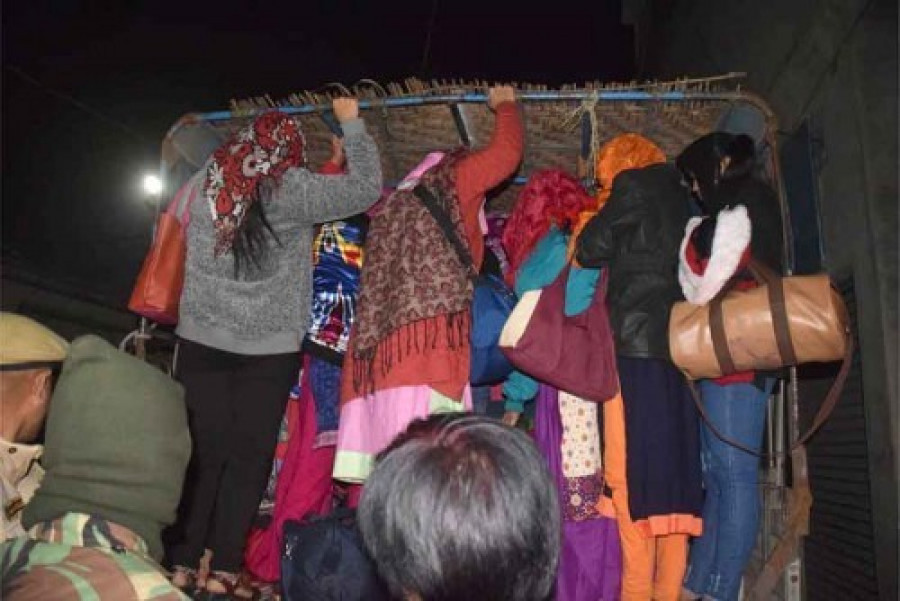National
Nepal doesn’t meet minimum standard for eliminating trafficking, a US government report says
The report suggests the Nepal government to investigate allegations of official complicity in trafficking crimes and hold perpetrators criminally accountable.
Binod Ghimire
Despite making significant efforts, the government of Nepal does not fully meet the minimum standards for the elimination of trafficking, according to a US government report.
Nepal government in 2019 demonstrated an overall increase in its efforts to prevent human trafficking compared to previous years. Still, these efforts were not enough to get the country out of Tier 2 watchlist of the trafficking in Persons Report. The countries belonging on the Tier 2 watchlist means their governments do not fully meet the minimum standards of the Trafficking Victims Protection Act, a law that provides tools to combat trafficking in persons, both worldwide and domestically.
The report published on Wednesday says Nepal demonstrated positive efforts towards investigating multiple government officials for complicity in human trafficking, identifying and removing more children, including trafficking victims, from exploitative care homes, and funding repatriation for more Nepali trafficking victims overseas.
While the report lauds the efforts of Nepal government to support Anti Human Trafficking Bureau and the federal parliament’s approval to the United Nations Trafficking in Person, 2000, it also points out several key areas where efforts are wanting in order for Nepal to meet the minimum standards.
The government’s laws do not criminalise all forms of labor trafficking and sex trafficking, and officials’ identification of, and protection for, male trafficking victims and transnational labor trafficking victims remained severely inadequate compared to the size of the problem, the report states.
The report also highlights official complicity in trafficking offences to be the most serious problem.
“The officials continued to encourage migrant workers exploited abroad to register cases under the 2007 Foreign Employment Act, which criminalized fraudulent recruitment, rather than refer cases to police for criminal investigation of labor trafficking,” according to the report.
Futhermore, the report also mentions the caes of police arresting, detaining and fining adult and child sex trafficking victims identified in the adult entertainment sector.
The reports on the situation of trafficking in persons, published annually by the National Human Rights Commission, also point out to the lack of adequate measure from the government to control human trafficking, which is a huge problem in Nepal.
A report published by the commission in August last year projected that nearly 1.5 million Nepalis are at risk of various forms of human trafficking. Aspiring migrant workers, people working abroad, people in the adult entertainment sector, girls and women from rural areas, missing persons and child labourers are among the groups most vulnerable to trafficking.
Foreign employment and child labour made up nearly 70 percent of the total trafficked population, followed by those from the entertainment sector and those reported missing, said the report.
The report prepared by the US government shows investigations are quite lower compared to the estimated cases of trafficking.
The police, the report says, conducted 258 investigations involving 524 suspects, the Office of the Attorney General initiated prosecution in 407 cases, and district courts convicted 231 traffickers in 110 cases in the last Nepali fiscal year. However, 243 suspects were acquitted by the district courts.
The report suggests the Nepal government to investigate allegations of official complicity in trafficking crimes and hold perpetrators criminally accountable and amend the Human Trafficking and Transportation (Control) Act to criminalise all forms of sex trafficking and labor trafficking, in line with the 2000 UN Trafficking in Person Protocol. The report also recommends removing a provision in the Act that allows the judiciary to fine victims if they fail to appear in court and hold them criminally liable for providing contradictory testimony.
The list of suggestions also includes training front-line responders on standard operating procedures to identify and refer trafficking victims to services, especially male labor trafficking victims and females in commercial sex.




 13.12°C Kathmandu
13.12°C Kathmandu














